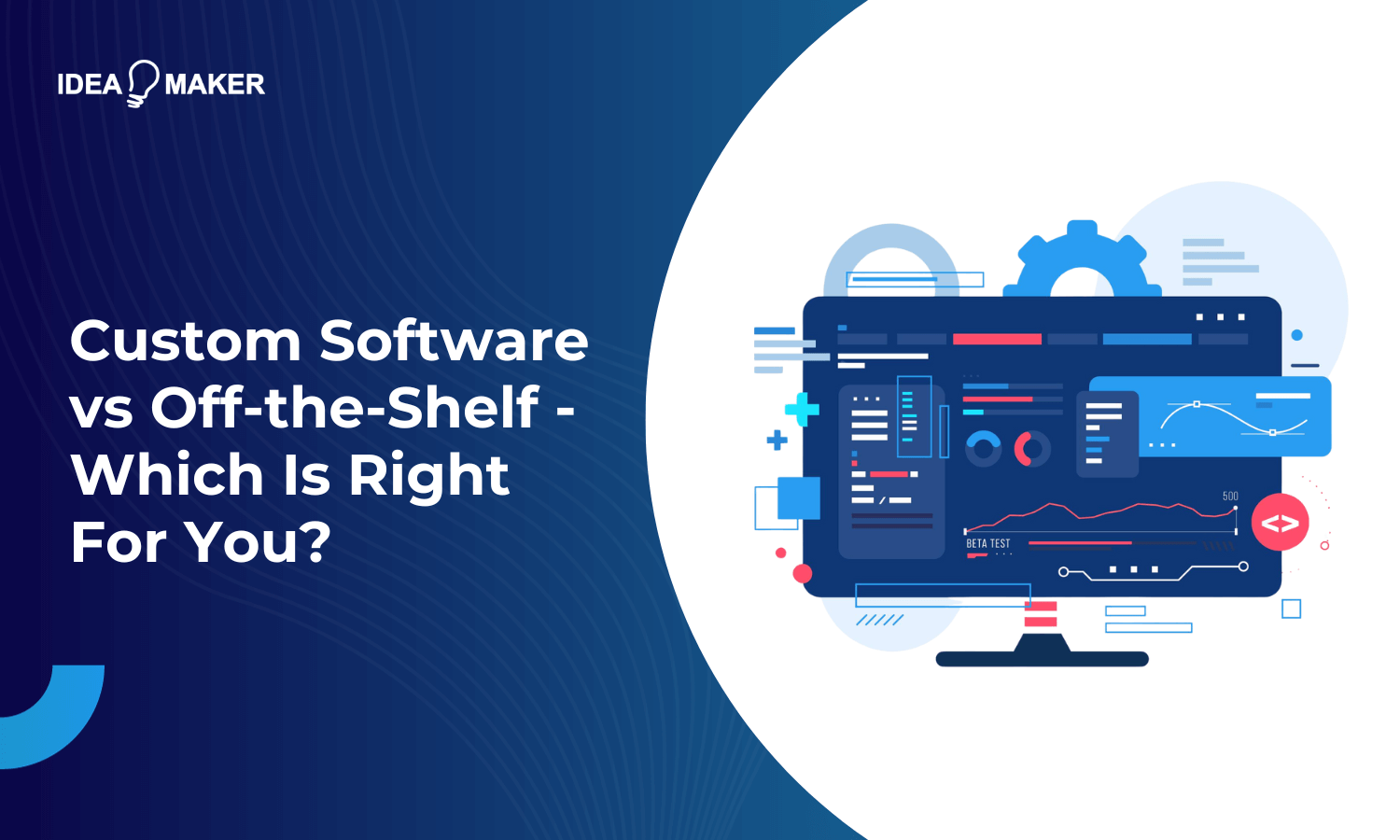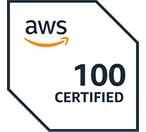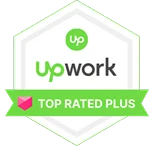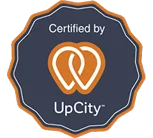Table of Contents
So, you’re looking to increase your business’s efficiency with software, but unsure what type of solution is right for you. There are two types to consider: off-the-shelf applications and custom software. Both come with several benefits and drawbacks. In this article, we discuss the pros and cons of off-the-shelf and custom software to help you decide which is best for your company. Let’s dive in!
What Is Custom Software? – An Overview
Custom software refers to applications that are built for a specific purpose at the request of a business or individual. Unlike existing, or “off-the-shelf”, custom software comes with functionality tailored to the exact needs of businesses, allowing it to serve a unique purpose.
Pros of Custom Software
If you’re unsure as to why you might choose to develop your own custom software over using an existing alternative, let’s explore some benefits of custom software.
Tailored Solutions
Custom software, as mentioned in the above definition, brings unique functionality tailored to your exact needs. This is especially useful if you operate a niche business wherein off-the-shelf software solutions don’t hit the mark in terms of functionality. Custom functionality brings your business tech capable of streamlining operations and implementing efficient workflows.
What’s more, custom software solutions are built with your branding in mind, meaning that functionality and brand are tied together. If you’re building a customer-facing application, this is highly important as consistent branding is essential for creating a memorable brand experience. Custom software far exceeds the capabilities of off-the-shelf white-label software, too, in regards to aesthetics, brand, and customization.
Flexibility and Scalability
As your business grows, you need software that’s capable of meeting the changing demands of your daily operations. Custom software facilitates a high level of flexibility and scalability by giving you the control to make updates where necessary. For example, if you need to increase user capacity, this can be done by upgrading server capacity – something you can’t personally do with off-the-shelf software.
Additionally, as your user or customer base grows, you might identify the need for more features to satisfy the requirements of users. With custom software, you don’t need to wait for new feature updates from service providers, you can go right ahead and add new features yourself (or more likely through your development partner).
Control
With custom software, you have full control to make any changes or updates on your own timeline based on your business needs, without relying on or waiting for a vendor. This empowers you to continuously refine and optimize your systems.
With the freedom to modify custom software whenever needed, you can promptly respond to new business requirements, integrate emerging technologies, and implement optimizations as your operations scale over time – crucial agility that off-the-shelf solutions lack.
Cons of Custom Software
It’s not all sunshine and rainbows, of course. Custom software comes with some disadvantages that you should consider. However, the question is, do the cons outweigh the cons of off-the-shelf software? Find out later!
Cost and Time
Custom software typically requires a high initial investment in order to develop your application. What’s more, as custom software is purpose-built, you might face a long wait before you can use it, depending on its level of complexity. However, custom software is poised to generate a high return on investment (ROI) in the long run, something that off-the-shelf applications are unlikely to provide.
What’s more, you’ll also be saving yourself the cost of monthly software subscription fees which can add up to a high sum over a long period of time. So, while custom software has a high initial cost and development time, you’ll likely save money in the long run, and with custom features, it’s worth the wait.
Provider Dependency
Unless you have sufficient technical knowledge, you will remain dependent on your software development company for the lifespan of your software. If you’re working with an expert software development agency that provides robust post-release support options, this shouldn’t be an issue. However, what if you have a contentious relationship with your developer, and what if they’re unreliable?
If you’re unhappy with your development team but are committed to maintaining your software long-term, then you’ll need to switch providers which can be a hassle. The best way to avoid this happening is by effectively choosing a software development team.
Maintenance Responsibility
If you plan to use your software long-term and have generated a solid user base, you have a responsibility for maintenance. With off-the-shelf applications, you simply use the software without concern for how it’s maintained and its updates.
Developing custom software, however, means you’re responsible for keeping it up-to-date and functioning correctly, which can be a burden on resources. If you’re working with the right software development agency, they will offer robust post-release support options to help keep your application properly maintained.
What Is Off-the-Shelf Software? – An Overview
Off-the-shelf software refers to applications that are prebuilt and available for use by any business or individual. This type of software is not purpose-made and typically comes with generalized features aimed at satisfying the needs of multiple businesses in certain industries. Off-the-shelf software is not tailor-made to meet the specific needs of individual businesses, though there are many white-label options.
Pros of Off-the-Shelf Software
Like custom software, off-the-shelf also comes with several advantages that might suit your business.
Cost and Deployment
One of the main reasons businesses choose off-the-shelf software over custom is the low cost and easy deployment. In fact, in most cases there’s nothing for you to deploy, so to speak – maybe you have to download an application to your computer or some new drivers, but that’s all. And with more businesses than ever following the SaaS monthly subscription model, off-the-shelf software is highly affordable.
However, monthly subscriptions add up much quicker than you might think, especially when dealing with enterprise-level applications which can cost hundreds per month. By paying this monthly fee, you are only renting the software – despite the ongoing cost, you own nothing and have no options to truly customize systems.
Community and Support
When using an existing platform that has a large user base, you’ll often find well-documented support and a community wherein you can ask questions. This means that you can solve software issues yourself, without having to pay for post-release support. Though this is convenient, if there’s a fundamental issue with the software you’re using, you have no power to fix it yourself.
While community forums can help resolve common issues with off-the-shelf software, they lack the direct, dedicated support and accountability offered by an expert development team invested in your project’s success. Critical bugs or feature requests may go unaddressed.
Reliability
When you use off-the-shelf software, you can be confident in its stability, especially if it has a solid user base and has been around for a while. Off-the-shelf software tends to have a higher level of reliability than newly developed applications. This is because it will have been tested by more users over a longer period of time, allowing bugs to be identified and fixed.
Of course, this is not always the case. If, for example, you do encounter a bug while using off-the-shelf software, you have little control over its fix – typically, you can only go as far as reporting the bug to the developers. This means that, although off-the-shelf software offers high reliability, you can be waiting a while for bug fixes.
Cons of Off-the-Shelf Software
Off-the-shelf software might be an excellent choice for convenience, but it comes with several disadvantages that should be considered.
Customization Limits
Perhaps the most obvious drawback of off-the-shelf software is its customization limitations. As you don’t have access to the software’s source code, you cannot fully customize its features or appearance.
Off-the-shelf software with hardcoded features may present integration and workflow challenges if it is not designed for your industry’s specific needs and processes. Custom solutions are built to your precise specifications to seamlessly operate within your technological and operational environment.
Redundant Features
Being made to serve the needs of many different businesses, off-the-shelf applications tend to come with a surplus of redundant features. Well, surely I could just not use them? you’re thinking to yourself. However, the more features the more chance of lag and slowdown, as well as a cluttered user interface.
Redundant features can bloat the software causing it to function sluggishly, which creates frustrating, and unnecessary, inefficiencies. This is not a problem with custom software as it’s built for a specific purpose with only features that are essential to your business.
Long-Term Costs
At first, paying a monthly subscription fee for your software may seem like a good deal. However, if you plan to use the application in the long term, your costs will add up. And with some off-the-shelf enterprise-level software costing hundreds a month, you’re spending more than you would if you built your own software.
Not only do you have to consider monthly fees, but the cost of hardware, too. You may find, for example, that the hardware you use is not compatible with the off-the-shelf software. If there isn’t an alternative application available, you’re stuck paying for new machines – again, this cost will rival that of custom software.
How Can Idea Maker Help Your Software Development Project
So, by now you should have a better idea as to what type of software fits your business best. If you’ve decided that you’re going with custom software – great! You’re making a positive choice for your business. And, what’s more, you’re already in the best place to get started.
At Idea Maker, we are highly experienced in custom software development and have a team of exceptionally talented developers dedicated to delivering quality. Go ahead and schedule a free consultation with us today to get started.













